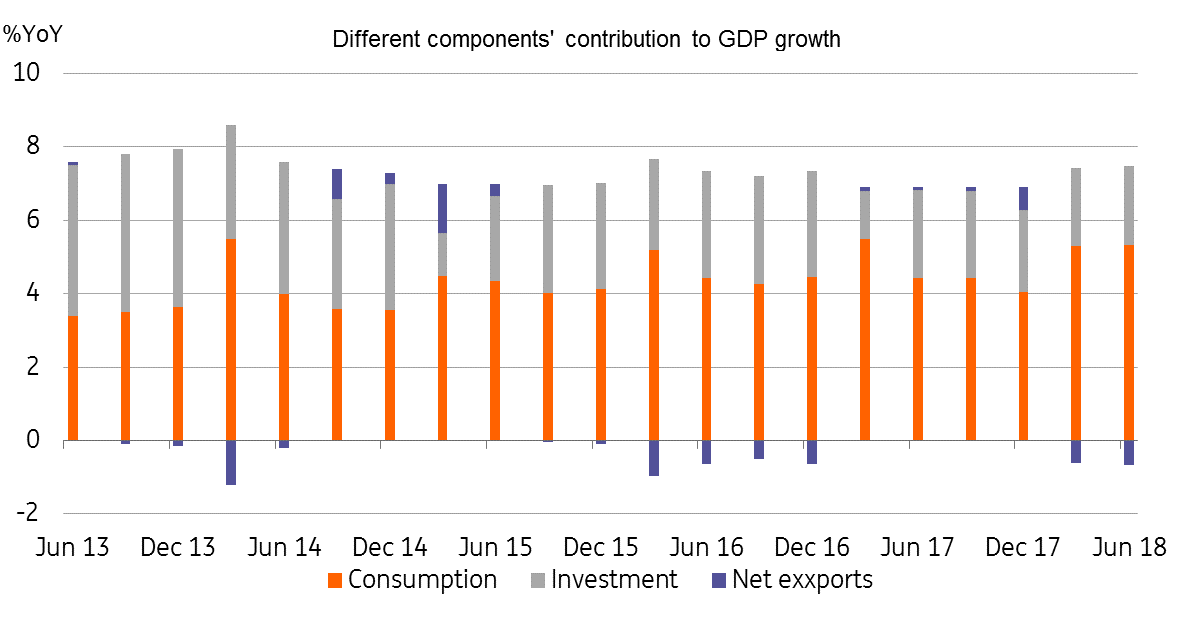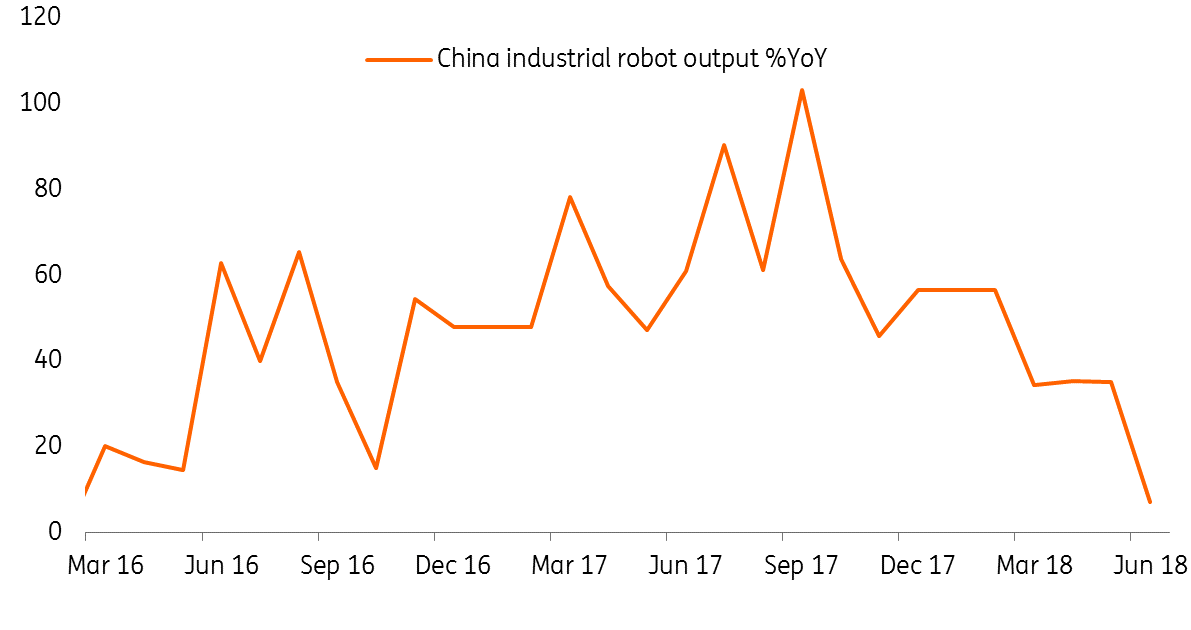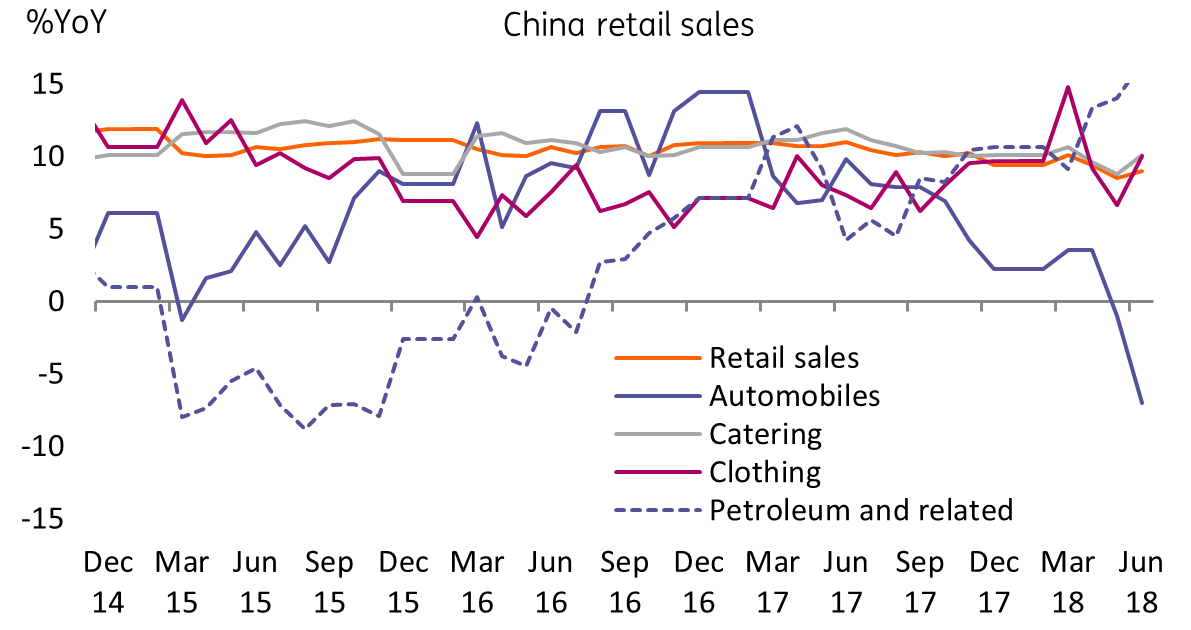China: GDP forecasts cut on trade war
The ongoing trade war will affect future GDP directly via the manufacturing and logistics services sectors. Though the government will provide support via fiscal and monetary policies, it is inevitable that industrial production will slow, which could hurt wage growth and consumption
As expected GDP rose 6.7% YoY
GDP grew 6.7% YoY in 2Q, slightly lower than 6.8% in 1Q. Consumption was still the growth engine, contributing 78.5% of economic growth in 1H18, followed by investment (31.4%) then net exports (-9.9%).
China

Manufacturing slowed - even high tech
Industrial production slowed to 6.0% YoY in June, from 6.8% in May. We expect manufacturing in export sectors will slow further as the trade war begins to materially impact the economy.
Even robot production grew just 7.2% YoY in June, compared to 23% YoY YTD. This is a significant drop and could be a reflection of over cautious export manufacturers.
Exporters are cautious on investment even high-tech equipment

Investment growth stabilised
Investment growth remained at 6.0% YoY in June. Infrastructure investment continued to fall as financing tightened.
Property investment (9.7% YoY) emerged as the main pillar to support headline investment, while investment in electronics (19.7% YoY YTD) also registered traction. Entertainment-related investment, anchored by strong domestic demand, also grew quickly (17.5% YoY YTD).
Real estate will continue to be the support of fixed asset investments in this trade war

Retail sales grew faster
Retail sales grew faster at 9.0% YoY in June up from 8.5% in May. This shows that consumption is slower to react to the trade war compared to the manufacturing sector.
The most eye-catching figure is that retail sales of vehicles shrank 7% YoY. Don't over-read this data as consumers are waiting for tariff cuts of non-US vehicles to be reflected in auto prices.
Don't panic about negative vehicle sales, consumers are just waiting for a price cut

Future growth relies on supportive policies
Consumption growth depends on salary rises, which in turn depend on business profits. The ongoing trade war will limit profits of exporters, as well as those of supply chain linked participants, including shipping and ports. Though SOEs will be able to absorb labour from the private sector in hard times, wage growth will still likely slow.
We believe that fiscal spending on high-tech R&D will increase quickly to offset the loss in investment from exporters. Similarly, reform of salary taxes could boost consumption.
Required reserve ratio (RRR) cuts for SMEs will probably continue every quarter. Borrowing costs for SMEs will need to be lower to survive the trade war.
If the trade war does hit the economy hard, then the government will substantially increase investment, especially in high-tech sectors. This will help stabilise economic growth and job security to stave off social unrest.
In this instance, the central bank will put financial deleveraging aside to focus on growth.
Revising GDP growth
We are revising our GDP growth forecast to 6.6% in 3Q and 6.5% in 4Q from 6.7%, as the drag from trade should be partially offset by policy support.
Download
Download article20 July 2018
In Case You Missed It: Nothing thrilling This bundle contains {bundle_entries}{/bundle_entries} articles"THINK Outside" is a collection of specially commissioned content from third-party sources, such as economic think-tanks and academic institutions, that ING deems reliable and from non-research departments within ING. ING Bank N.V. ("ING") uses these sources to expand the range of opinions you can find on the THINK website. Some of these sources are not the property of or managed by ING, and therefore ING cannot always guarantee the correctness, completeness, actuality and quality of such sources, nor the availability at any given time of the data and information provided, and ING cannot accept any liability in this respect, insofar as this is permissible pursuant to the applicable laws and regulations.
This publication does not necessarily reflect the ING house view. This publication has been prepared solely for information purposes without regard to any particular user's investment objectives, financial situation, or means. The information in the publication is not an investment recommendation and it is not investment, legal or tax advice or an offer or solicitation to purchase or sell any financial instrument. Reasonable care has been taken to ensure that this publication is not untrue or misleading when published, but ING does not represent that it is accurate or complete. ING does not accept any liability for any direct, indirect or consequential loss arising from any use of this publication. Unless otherwise stated, any views, forecasts, or estimates are solely those of the author(s), as of the date of the publication and are subject to change without notice.
The distribution of this publication may be restricted by law or regulation in different jurisdictions and persons into whose possession this publication comes should inform themselves about, and observe, such restrictions.
Copyright and database rights protection exists in this report and it may not be reproduced, distributed or published by any person for any purpose without the prior express consent of ING. All rights are reserved.
ING Bank N.V. is authorised by the Dutch Central Bank and supervised by the European Central Bank (ECB), the Dutch Central Bank (DNB) and the Dutch Authority for the Financial Markets (AFM). ING Bank N.V. is incorporated in the Netherlands (Trade Register no. 33031431 Amsterdam).

